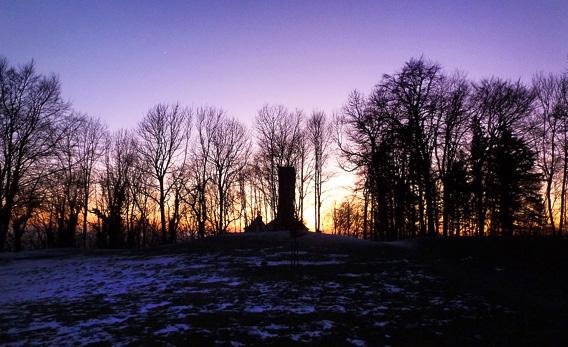Struggling Against the Dark
A poem for the winter solstice.

Photograph by Matzei/Wikimedia Commons.
At this time of year Slate has in the past presented classic poems about Christmas and New Year's Day. For 2012, here is a poem set at, and in some sense about, the winter solstice. (Or, close to it and mixed up with it, St. Lucy's Day.)
St. Lucy, blinded and the patron saint of blind people, has a name meaning “light,” as in the word “lucid.” Such opposites joined, and wielded to spur deeper understanding, make up a poetic method for John Donne. His poem of profound grief is notably animated by the language of 17th-century science and technology: squibs, rays, hydroptic, alchemy, quintessence, limbec, chaoses, elixir.
The performative, even flamboyant expression of grief seems functional: a spiritual exercise designed to wake the poet's soul up and out of the state of privation that our contemporary jargon calls “depression.” The shocking energy of the rhetoric is an expressive means of struggling against the dark.
The language of absence, privation, nothingness has scientific, moral and emotional force. As dark is an absence of light energy, not an entity in itself, death too is an absence rather than a force or a being. That conviction underlies the statement that Love's alchemical limbec turned the leaden soul, with its “dull privations and lean emptiness” into the golden sense of being. The theology and science, the terms of nothing and being, absence and presence—it's all a way for the poet to sharpen the understanding of what he lacks, and what he loves. The poem's athletic feats of wit may entertain readers, or disconcert them, but it has a purpose beyond rhetoric: it is an act of mourning ... and, maybe, an act of self-heartening, too.
Click the arrow on the audio player below to hear Robert Pinsky read John Donne’s “A Nocturnal Upon St. Lucy’s Day, Being the Shortest Day.” You can also download the recording or subscribe to Slate's Poetry Podcast on iTunes.
“A Nocturnal Upon St. Lucy’s Day, Being the Shortest Day”
TIS the year's midnight, and it is the day's,
Lucy's, who scarce seven hours herself unmasks;
The sun is spent, and now his flasks
Send forth light squibs, no constant rays;
The world's whole sap is sunk;
The general balm th' hydroptic earth hath drunk,
Whither, as to the bed's-feet, life is shrunk,
Dead and interr'd; yet all these seem to laugh,
Compared with me, who am their epitaph.
Study me then, you who shall lovers be
At the next world, that is, at the next spring;
For I am every dead thing,
In whom Love wrought new alchemy.
For his art did express
A quintessence even from nothingness,
From dull privations, and lean emptiness;
He ruin'd me, and I am re-begot
Of absence, darkness, death—things which are not.
All others, from all things, draw all that's good,
Life, soul, form, spirit, whence they being have;
I, by Love's limbec, am the grave
Of all, that's nothing. Oft a flood
Have we two wept, and so
Drown'd the whole world, us two; oft did we grow,
To be two chaoses, when we did show
Care to aught else; and often absences
Withdrew our souls, and made us carcasses.
But I am by her death—which word wrongs her—
Of the first nothing the elixir grown;
Were I a man, that I were one
I needs must know; I should prefer,
If I were any beast,
Some ends, some means ; yea plants, yea stones detest,
And love; all, all some properties invest.
If I an ordinary nothing were,
As shadow, a light, and body must be here.
But I am none; nor will my sun renew.
You lovers, for whose sake the lesser sun
At this time to the Goat is run
To fetch new lust, and give it you,
Enjoy your summer all,
Since she enjoys her long night's festival.
Let me prepare towards her, and let me call
This hour her vigil, and her eve, since this
Both the year's and the day's deep midnight is.